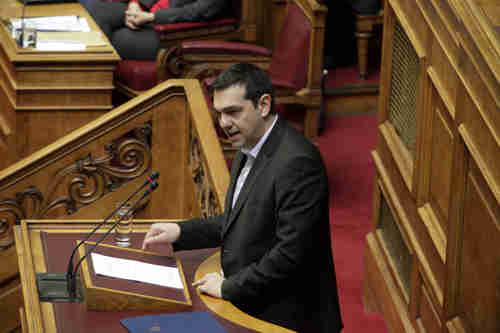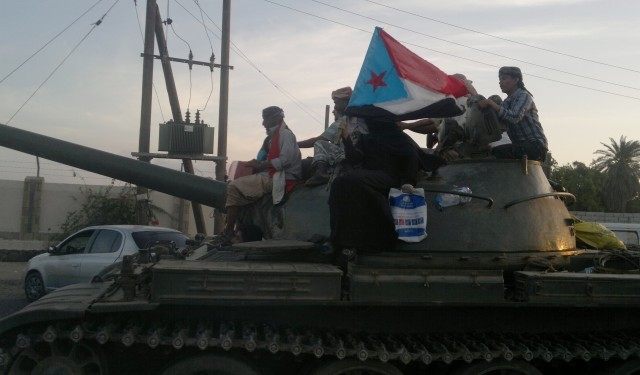This morning’s key headlines from GenerationalDynamics.com
- Greece’s Alexis Tsipras threatens Europe with ‘jihadists and terrorists’
- Eurogroup chairman suggests capital controls in Greece
- Houthi airstrikes bomb Aden as Yemen war widens
- Kerry: US is ‘deeply disturbed’ by Syrian regime’s chemical weapons
Greece’s Alexis Tsipras threatens Europe with ‘jihadists and terrorists’

Alexis Tsipras speaking to Greek parliament (Kathimerini)
Greece’s prime minister Alexis Tsipras called on European leaders to take “bold initiatives” to save Greece on Thursday, after EU leaders continued to demand that Tsipras meet the commitments that he has already made. Last month, the Europeans gave Tsipras a four-month reprieve, on condition that he come up with a list of reforms to explain how he is going to meet the existing terms of its bailout agreement. The list of reforms would have to address a number of economic issues, including the bloated public sector, curbing tax evasion and corruption, privatizing public businesses, and adjusting generous pension and minimum wage policies. The list was due almost a month ago, but it is becoming increasingly clear that Tsipras is not going to provide any such list.
In fact, he is going in the opposite direction, sponsoring a “humanitarian bill” in the Athens parliament to spend additional government money to help Greeks in poverty.
Tsipras actually threatened EU leaders in recent comments by saying that an influx of “jihadists and terrorists” into Europe from Greece could be imminent, if bailout negotiations weren’t completed.
Ireland’s prime minister Enda Kenny responded harshly:
People are very encouraged to give Greece support and to give it its time and space to come forward with sustainable solutions, but there’s a difference between political argument and disagreement and threats of releasing jihadists and terrorists in Europe. That’s not acceptable.
Greece’s situation is increasingly desperate. There’s a bank run going on, and 350 million euros were withdrawn from Greek banks on Wednesday alone. Next week, pensions and public sector salaries have to be paid, and Greece has no money to pay them. The yields (interest rates) on Greece’s 3-year bonds rose to 20.44% on Thursday.
So when Tsipras asks for “bold initiatives,” what he means is that he wants bailout money without have to make any reforms. In fact, he actually begged EU leaders to meet with him on Thursday evening, in the hope that they would approve more bailout money. Leaders of France and Germany did meet with him, but without making any decision.
So the atmosphere between Tsipras and the EU is extremely poisonous, with no compromise in sight at the present time.
As I have been saying for years, ever since Greece’s financial crisis began, no solution exists for the Greek financial crisis. And by that I don’t mean that no one has been clever enough to figure out a solution. I mean that no solution exists. Furthermore, the longer the situation is prolonged by “kicking the can down the road” time after time, the worse the crisis becomes, because Greece’s debt burden keeps worsening. It’s hard to avoid the feeling that a dénouement is very close. BBC and Irish Times and Telegraph (London)
Eurogroup chairman suggests capital controls in Greece
Dutch Finance Minister Jeroen Dijsselbloem, who is also the chairman of the Eurogroup of eurozone finance ministers, is raising the possibility of imposing capital controls on Greece to stop the bank run that’s currently in progress. According to Dijsselbloem:
It’s been explored what should happen if a country gets into deep trouble — that doesn’t immediately have to be an exit scenario. [For Cyprus], we had to take radical measures, banks were closed for a while and capital flows within and out of the country were tied to all kinds of conditions, but you can think of all kinds of scenarios.
A Greek government spokesman reacted angrily:
It would be useful for everyone and for Mr Dijsselbloem to respect his institutional role in the eurozone. We cannot easily understand the reasons that pushed him to make statements that are not fitting to the role he has been entrusted with. Everything else is a fantasy scenario. We find it superfluous to remind him that Greece will not be blackmailed.
With Dijsselbloem’s remarks about capital controls, and Tsipras’s comments about “jihadists and terrorists,” it seems that there’s a lot of blackmail in the air. Bloomberg and Kathimerini
Houthi airstrikes bomb Aden as Yemen war widens
Explosions were heard across Aden in the south of Yemen on Thursday, as warplanes attacked the presidential palace in Aden, forcing Abdu Rabu Mansour Hadi, the internationally recognized president of Yemen, to go into hiding. Last year, the Iran-backed Shia Houthi tribes from northern Yemen invaded and took control of the northern city of Sanaa, the nation’s capital city, forcing Hadi to flee south to Aden last month, where he’s been supported by some Sunni Muslim tribes.
The Houthis have now allied with the former president Ali Abdullah Saleh, taken control of Yemen’s air force, and are now in all out fighting in Yemen. Iran has started regular flights between Tehran and Sanaa, and is shipping weapons to the Houthis.
Al-Qaeda in the Arabian Peninsula (AQAP), which is headquartered in Yemen, is said to be taking advantage of the situation by attacking both sides.
Yemen is on Saudi Arabia’s southern border, and it’s not expected that the Saudis will indefinitely tolerate an Iran-backed Shia kingdom on its border. In 2009, Saudi Arabia bombed the Houthis in their home governorate of Saada. The possibility exists of a proxy war between Iran and Saudi Arabia in Yemen.
There are hundreds of thousands of Yemenis working in Saudi Arabia. As the war in Yemen worsens, they fear being deported back to Yemen. In 1990, Saudi Arabia deported 850,000 Yemenis.
As we’ve been reporting for months, there is a large and growing Muslim versus Muslim war throughout the Mideast, northern Africa and south Asia, killing 5,000-10,000 Muslims every month. These wars are both tribal and sectarian. Sooner or later, the West is going to be dragged into one of these wars, and it will be a full-scale war consuming the entire region. Yemen Post and AP and Reuters and Yemen Times
Kerry: US is ‘deeply disturbed’ by Syrian regime’s chemical weapons
According to Secretary of State John Kerry, the United States is “deeply disturbed” by reports that forces from the regime of Syria’s president Bashar al-Assad attacked the town of Sarmin as a weapon on Tuesday. According to Kerry:
We are looking very closely into this matter and considering next steps. While we cannot yet confirm details, if true, this would be only the latest tragic example of the Assad regime’s atrocities against the Syrian people, which the entire international community must condemn.
I just have to wonder what the point of this is. The al-Assad regime has been dropping barrel bombs laced with chlorine for years, killing entire neighborhoods filled with women and children, and killed hundreds of people using Sarin gas– which triggered the Administration’s disastrous flip-flop on its “red line” policy, and let al-Assad continue with chemical weapons with impunity. Now, suddenly, Kerry is “deeply disturbed.” I never have the feeling that this administration has any idea what’s going on in the world. Reuters
KEYS: Generational Dynamics, Greece, Alexis Tsipras, Ireland, Enda Kenny, Jeroen Dijsselbloem, Eurogroup, Yemen, Houthis, Sanaa, Aden, Ali Abdullah Saleh, Abdu Rabu Mansour Hadi, Saudi Arabia, Saada, Al-Qaeda in the Arabian Peninsula, AQAP, Syria, John Kerry, Bashar al-Assad, Sarmin
Permanent web link to this article
Receive daily World View columns by e-mail

COMMENTS
Please let us know if you're having issues with commenting.